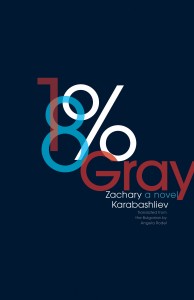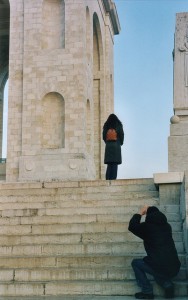 I met Zachary Karabashliev in Bulgaria in the summer of 2012, and have two indelible impressions of him that I won?t be able to shake. The first came at a restaurant during the final night of the Sozopol Fiction Seminars. The program?s founder, Elizabeth Kostova, hushed everyone for an ?announcement? and then?having been encouraged by several regular participants?proceeded to start singing in Bulgarian, surprising everyone who did not know her deep background in the nation?s folk music. The Bulgarians quickly joined in, and the singing went on well past three in the morning, when I conked out.
I met Zachary Karabashliev in Bulgaria in the summer of 2012, and have two indelible impressions of him that I won?t be able to shake. The first came at a restaurant during the final night of the Sozopol Fiction Seminars. The program?s founder, Elizabeth Kostova, hushed everyone for an ?announcement? and then?having been encouraged by several regular participants?proceeded to start singing in Bulgarian, surprising everyone who did not know her deep background in the nation?s folk music. The Bulgarians quickly joined in, and the singing went on well past three in the morning, when I conked out.
Through the songs (Bulgarian intermixed with American pop and a few old Socialist tunes) I kept seeing a man in denim jumping up and down with infectious excitement and energy. He looked about my age, with a bit of gray at the temples?just old enough to have done the pogo at a punk rock show back in the day?and he exuded the kind of vibe it?s almost impossible to be downhearted around.
This jumping man turned out to be Zachary Karabashliev, whose novel 18% Gray had been phenomenally popular in Bulgaria; though it only came out there in 2008, Bulgarians voted it as one of their one hundred most-loved books of all time. (Open Letter books, at the University of Rochester, has now published an English translation.) I went to his book fair event at the National Palace of Culture in Sofia, where he took questions and comments from a standing-room only crowd. After one woman spoke, Karabashliev put a hand to his heart and said a quiet, simple thank-you. I turned to my friend Bistra Velichkova for a translation.
?She said ?Thank you for telling my story,?? Bistra whispered to me, and I realized that I was in the presence of a big-hearted man who is able to touch people in a way that not all writers can. I met Karabashliev, got him to sign the Bulgarian edition of 18% Gray, and awaited the English translation. When I got my advance copy, I was surprised to see that the novel?s protagonist was a man?hadn?t the woman thanked its author for telling her story? When I read it, I understood what she meant. 18% Gray takes readers to that messy, sloshy place inside us where we don?t understand what we?re doing or why. It?s a place we?ve all been to, and Karabashliev is an outstanding and empathetic guide on the journey there and back.
The novel follows Zack, a Bulgarian photographer living in California, whose wife Stella has just disappeared. Distraught, he gets himself into  trouble in Tijuana and ends up coming back to the US with a large bag of pot in the back of a stolen van. He ditches his job observing clinical pharmaceutical tests?one he?d given up his own creative aspirations for, and which ultimately fueled Stella?s burgeoning artistic career?and embarks on a picaresque cross-country journey to New York. There, he learns a bit more about himself and his life than he would care to know.
trouble in Tijuana and ends up coming back to the US with a large bag of pot in the back of a stolen van. He ditches his job observing clinical pharmaceutical tests?one he?d given up his own creative aspirations for, and which ultimately fueled Stella?s burgeoning artistic career?and embarks on a picaresque cross-country journey to New York. There, he learns a bit more about himself and his life than he would care to know.
The strongest aspects of the novel are the empathy Karabashliev builds up for his protagonist and his bullseye details?I think these two are related, as we are always in a world that is viscerally and specifically Zack?s. Walking through a neighborhood, he sees ?bluish light flickering through the blinds, framed family pictures on the walls, posters of movie stars in the kids? rooms, pianos with the lids down?? The descriptions are concisely kaleidoscopic, and they drive the narrative of 18% Gray.
The title of this interview comes from a scene where Zack stops by the roadside and makes a square out of four sticks. ?Every time I lost something as a kid and I tried to find it and couldn?t, I?d get angry and be impossible to calm down. My grandma would tell me to close up the little devil. You close up the little devil with whatever is at hand?tree branches, pencils, or what have you. The important thing is to make some kind of a square and to imagine the little devil inside it. Then you find whatever you?ve lost.?
I can?t put my finger on why this scene is so resonant to me, or even thematically central to 18% Gray. But it?s my title and I?m sticking to it, maybe because it reflects how Karabashliev dropped me into the realm of non-understanding?right where I like books to go, because it?s where we humans live.
Interview:
 Steven Wingate: With an author named Zachary who transplanted from Bulgaria to southern California and a narrator named Zachary who did the same, readers can be forgiven for assuming there?s some autobiography to 18% Gray. I?m not interested in parsing out what?s autobiography and what?s not, but I?m curious to hear how you used autobiography?which I imagine varies across the scope of the book.
Steven Wingate: With an author named Zachary who transplanted from Bulgaria to southern California and a narrator named Zachary who did the same, readers can be forgiven for assuming there?s some autobiography to 18% Gray. I?m not interested in parsing out what?s autobiography and what?s not, but I?m curious to hear how you used autobiography?which I imagine varies across the scope of the book.
Zachary Karabashliev: I used it just like all the writers I respect and learn from used it before me?I borrow often and shamelessly. I used it as a warehouse of events that happened or almost happened at some point. 18% Gray is about a fictional character whose story I create using stuff I have direct access to.
Example: The violent Tijuana episode, which put Zack?s journey in motion, actually did happen. Only it didn?t happen in Mexico, but in Bulgaria, years ago, at a particular company Christmas party. I remember having too much fun, perhaps a few drinks too many, dancing, laughing, the whole deal?. Then I go out of the crowded restaurant to get some fresh air and the next thing I see is two men kicking the crap out of someone already knocked out on the ground. Vicious, savage scene. So I did what I did in real life, and ten years later that episode became the ?inciting incident? in my novel, the point that takes our protagonist out of his comfortable numbness.
Another example: the main character is a failed artist, a photographer who turns into a con artist, faking his way to land a job in the lucrative pharmaceutical industry. He fabricates an entire fictitious professional background, a fake past. He counterfeits a Neuroscience degree, finds a recruiter, goes from interview to interview, negotiates his future salary. In real life I stopped short of taking the position I was offered. To this day I remember how sick it made me feel, physically sick. Being a fraud takes the life out of you. Now, five years later, I still get emails from recruiters in the pharmaceutical industry?it?s insane.
So much of 18% Gray is autobiographical, but, everything is very fluid and goes both ways. Writing the novel I borrowed from real life, but after it was published, certain things in real life happened exactly like they were borrowed from the novel. Strange.
In person, you?re a buoyant, upbeat, and funny guy, and I see your humor in this novel?for instance, ?I can?t just burst out of the bedroom nude and start chasing off criminals like in a Swedish film.? Can you talk about the role of humor in your writing, and in this book in particular?
Ah, humor? I believe we humans share some common languages. Love (sex) is a universal language.? Violence/War is a universal language. Friendship/Hospitality also?. I think of humor as language, yet it?s so hard to translate at times. The first culture shock I experienced moving to the US (not knowing more than a hundred words in English) was not the skyscrapers, not the highways, not the lack of public transportation or the abundance of everything else. It was the realization of one brutal truth?I was not capable of understanding the language of humor. I wouldn?t get the comedy on Saturday Night Live, I wouldn?t grasp why others were laughing at certain things, which I thought were not funny. Also, I was not funny at all?I couldn?t crack a joke to save my life. It was worse than hunger. Some time went by before I felt comfortable with the language of humor, before I felt I belonged. One can truly feel at home only if one can laugh with the hosts.
On humor and writing?you, as a writer know how important it is. I balance this twisted and sad love story with a lot of humor, especially in the skewed way Zack sees the world and deals with it. Humor is Attitude. Attitude is Character. Character is Action.
At times I completely forgot that I was reading a novel written in another tongue, which is a credit to the fine translating job done by Angela Rodel. But I suspect it might also have to do with how facile you are in the American idiom given your experience in the US. What was it like working with Angela, and can you talk about your relationship with American English? Did you ever consider writing 18% Gray in your adopted language?
Working with Angela Rodel doesn?t feel like working. The first time I met her was at a book release party in Sofia. We talked for some time in Bulgarian, before I asked her where she was from and she told me she was an American. I was blown away by her Bulgarian. She had read the novel in Bulgarian, we talked about how cool it would be to share it with the American audience. Later, she translated some of my short stories into English and one of them was shortlisted for the Best European Stories collection?it is a fine, fine translation. Angela is a professional musician?I believe this has a lot to do with the way she translates. Funny, now thinking about it, my French translator Marrie Vrinat was also a musician, before she became a full time translator, linguist and college professor.? So maybe there is something about music and language.
My relationship with American English? Emotional. There are days that I feel I own it. And there are days I feel so helpless and I just want go back to Bulgaria where everybody speaks the same language, and I can say everything I want. I was twenty nine when I came to this country and for the first time in my life I had to actually think before I speak. (You see?I hadn?t tried that before.) What words to use, how to build a sentence, what tense and so on?. I had to listen more. That shut my mouth for a while. It was cruel. It made me appreciate thinking. Sometimes I dream in English the way I dream playing the guitar, like a virtuoso. It?s also funny that when I think in English I have no accent.
About writing 18% Gray in my adopted language: I?ve written plays and screenplays in English. And after a round of editing (with Angela Rodel) I feel good. I have an ear for dialogue, and I am okay with action sequences, and/or stage directions?it?s just straightforward writing. But I am aware of my limitations. I don?t feel confident enough to write prose?it will keep me within the boundaries of what I have acquired so far linguistically, and it?s just not enough. So I need my translator. At the end of the day you?ve raised your horses, now you have to trust someone to take them across the river and sell them in town. Someone who knows how.
I?ve been reading a lot of Bulgarian fiction lately, and this novel feels less self-consciously Bulgarian to me. Even a book like Miroslav Penkov?s East of the West, written in the US in English, feels like it studiously considers ?What is Bulgaria?? and ?What does it mean to be Bulgarian?? In your novel, Bulgaria comes across as (so Zachary calls it) ?a small country north of Greece.? Am I on to something here, or am I simply being seduced by all that southern California glitz, smog, and surf?
My collections of short stories are much more Bulgarian than my novel. I hope to share them with the American readers someday. Even though Bulgaria is the fabric of everything I have ever written, I don?t write about Bulgaria. In my writing I try to consider ?What does it mean to be this person, at this moment?? Being Bulgarian? What does it mean? Being Steve, Zack, Philip, Ivan, Joe, Bob is what interests me. I am busy tying to get into the character?s head?if it happens to be a Bulgarian head, great. We will learn a thing or two about being Bulgarian, growing up in a country about which the world knows virtually nothing.
But I can?t write with the big picture in mind. It confuses me. I like a tight POV, an unreliable narrator, I like being extremely personal, delving into the elemental. Writing about your own country is a weird task. Orhan Pamuk does it so well, right? He is exceptional in describing Istanbul in Museum of Innocence, or Kars in Snow, but there are moments that I catch myself thinking?this is so premeditated, redundant for native readers, made not for Turkish audience, but rather for cultural export. Yet, this is far from the truth. If we accept that the past is a foreign country, we should write about it accordingly. What I?ve read by Miroslav Penkov captures glimpses of unique Bulgarian experience and makes them universally intriguing, hilarious, and widely recognized?no Bulgarian writer has done this before.
The author bio mentions that you?ve written a screenplay for 18% Gray, which is in development. The novel has its cinematic elements, most obviously its use of third person present tense narration. Yet you break completely from the cinematic model in other ways?something I think is crucial for fiction writers to do because the cinematic aesthetic is so omnipresent that it threatens to engulf everything else in narrative culture. In what ways do you see yourself embracing or distancing yourself from the cinematic?
It?s funny how after cinema adopted the rules of millennia of storytelling and practically hijacked the ?hero?s journey? (the monomyth) now, we fiction writers have to deal with and challenge that. Cinema replicates narrative tradition with new means, but in terms of storytelling it has not invented all that much.
The feedback from my readers unanimously touches on the cinematic aesthetic of the novel. ?It was like I was watching a movie,? ?I read it in one day,? and so on. And I take that as a compliment. I guess that was also the appeal for the producers to buy the film rights and trust me with writing the script. I love film. But 18% Gray was conceived and constructed as a novel. It was not meant to be a surrogate for a movie. Even though I employ techniques from screenwriting, and at times borrow from the visual arts, I am not an advocate for the ?show don?t tell? doctrine that has dominated the craft of too many fiction writers for the last I-don?t-know-how-many years.
Our civilization today is ruled by the visual, and this is normal?nearly a third of our brain is dedicated to vision. Through brain scanning, neuroscience and linguistics research shows that while reading words, we use the same cognitive tools that allow us to react to our environment, reconstruct memories, and so on. So if you want to be ?heard? as a writer, you need to ?show? more. Great, but that makes us, storytellers, compete with visual artists (especially film makers) for the mercy of the almighty Visual Cortex.? Well, what about Proust then? Dostoyevsky? James Joyce? What about Kundera, or Robert Pirsig, or a long line of writers that like to not just show, but tell us what they think about things?
I like ?show and tell.? Looking back now, I think I have used certain cinematic approaches to bribe the reader?s attention, to suspend disbelief and hold attention to the words. I never take my reader?s attention for granted. I always feel I have to fight for it.
There?s quite a bit of braiding in this book?three different skeins of time intercutting with each other. How did you do that braiding on a practical, hands-on level? Did you write one continuous thread of the narrative out and then cut them up, or a lot of jumps back and forth in a given draft?
The braiding as it is now follows the way I wrote the novel. I started with the first person, present tense narrative and continued with no break for, let?s say 70 or so pages. The ?iceberg? was there, you see, the NOW narrative. But then I didn?t know what to do with it. I was stuck there on that iceberg for about three years. When I finally shared it with a friend, an editor, and she started asking me why this, and why that, I realized I needed to pull more from underneath in order to move ahead. And I did. And the other narrative surfaced?past tense, the BEFORE story.
The third skein, the disembodied dialogues, came the latest. I needed quiet, calm places for breathing, neither NOW, nor BEFORE, neither HERE, nor THERE. I wanted them visually distinct, so they are aligned kind of weird?to the right of the page. The actual braiding of the text came late, in the ?editing? room as if I was working with film footage. To me, that was the most gratifying aspect of writing.
 This book revolves around art; Zack is a photographer (as you were professionally), and his beloved Stella is a painter. ?That?s what every true collector wants,? says one of your characters toward the end of the novel, ?to buy a piece of life.? I imagine you feel the same way about fiction. How, for you, did writing this novel capture the life of person who made it?
This book revolves around art; Zack is a photographer (as you were professionally), and his beloved Stella is a painter. ?That?s what every true collector wants,? says one of your characters toward the end of the novel, ?to buy a piece of life.? I imagine you feel the same way about fiction. How, for you, did writing this novel capture the life of person who made it?
There is this Bulgarian folk ballad of the ?walled-in bride.? It has many variations, but in short it tells the story of three brothers ?who are building something important, a fortress maybe. Well, they build during the day, but it mysteriously falls down at night. Something is preventing them from getting the job done. So they somehow agree that a human sacrifice is needed.? The brothers decide that whichever of their wives comes first to the site in the morning will be walled in.
The two elder brothers warn their wives. The youngest brother doesn?t tell his young, still-nursing wife about the horrible trap. So early in the morning she wakes up, cooks food for all the brothers and shows up at the construction site. The youngest brother is devastated, he is crying, but he remains true to his word. He pretends he drops his wedding ring by the destructed walls and asks her to go down and find it. She does. They wall her in. She is immured. The building is built.
Obviously this cruel tale is not just about construction contractors and their wives. Without going too Jungian about it, we can interpret it as asking this question: as artists, are we ready to sacrifice what we love the most to finish the work we are summoned to do? Are we? Which brother am I? You? What did you wall in, building your little fortress? Your time, your joy, your love?
What?s the first-book experience in America like for you so far compared to how it was in Bulgaria? What are some of the constants, the differences?
The first feedback from the few advanced copies given away is amazingly similar to the first reception it had in Bulgaria. I hope and pray to be able to touch my American readers. As always, I remain cautiously optimistic.
Links & Resources
- Read an excerpt of 18% Gray online.
- Buy 18% Gray from Open Letter Books.
- Learn more about the Sozopol Fiction Seminar.
- For more information on Karabashliev or his work, please visit the author?s Website.
Source: http://fictionwritersreview.com/interviews/close-up-the-little-devil-an-interview-with-zachary-karabashliev
varez ward solar storms uganda the parent trap invisible children kony 2012 space weather sunspots
 I met Zachary Karabashliev in Bulgaria in the summer of 2012, and have two indelible impressions of him that I won?t be able to shake. The first came at a restaurant during the final night of the Sozopol Fiction Seminars. The program?s founder, Elizabeth Kostova, hushed everyone for an ?announcement? and then?having been encouraged by several regular participants?proceeded to start singing in Bulgarian, surprising everyone who did not know her deep background in the nation?s folk music. The Bulgarians quickly joined in, and the singing went on well past three in the morning, when I conked out.
I met Zachary Karabashliev in Bulgaria in the summer of 2012, and have two indelible impressions of him that I won?t be able to shake. The first came at a restaurant during the final night of the Sozopol Fiction Seminars. The program?s founder, Elizabeth Kostova, hushed everyone for an ?announcement? and then?having been encouraged by several regular participants?proceeded to start singing in Bulgarian, surprising everyone who did not know her deep background in the nation?s folk music. The Bulgarians quickly joined in, and the singing went on well past three in the morning, when I conked out. trouble in Tijuana and ends up coming back to the US with a large bag of pot in the back of a stolen van. He ditches his job observing clinical pharmaceutical tests?one he?d given up his own creative aspirations for, and which ultimately fueled Stella?s burgeoning artistic career?and embarks on a picaresque cross-country journey to New York. There, he learns a bit more about himself and his life than he would care to know.
trouble in Tijuana and ends up coming back to the US with a large bag of pot in the back of a stolen van. He ditches his job observing clinical pharmaceutical tests?one he?d given up his own creative aspirations for, and which ultimately fueled Stella?s burgeoning artistic career?and embarks on a picaresque cross-country journey to New York. There, he learns a bit more about himself and his life than he would care to know. Steven Wingate: With an author named Zachary who transplanted from Bulgaria to southern California and a narrator named Zachary who did the same, readers can be forgiven for assuming there?s some autobiography to 18% Gray. I?m not interested in parsing out what?s autobiography and what?s not, but I?m curious to hear how you used autobiography?which I imagine varies across the scope of the book.
Steven Wingate: With an author named Zachary who transplanted from Bulgaria to southern California and a narrator named Zachary who did the same, readers can be forgiven for assuming there?s some autobiography to 18% Gray. I?m not interested in parsing out what?s autobiography and what?s not, but I?m curious to hear how you used autobiography?which I imagine varies across the scope of the book.
 This book revolves around art; Zack is a photographer (as you were professionally), and his beloved Stella is a painter. ?That?s what every true collector wants,? says one of your characters toward the end of the novel, ?to buy a piece of life.? I imagine you feel the same way about fiction. How, for you, did writing this novel capture the life of person who made it?
This book revolves around art; Zack is a photographer (as you were professionally), and his beloved Stella is a painter. ?That?s what every true collector wants,? says one of your characters toward the end of the novel, ?to buy a piece of life.? I imagine you feel the same way about fiction. How, for you, did writing this novel capture the life of person who made it?